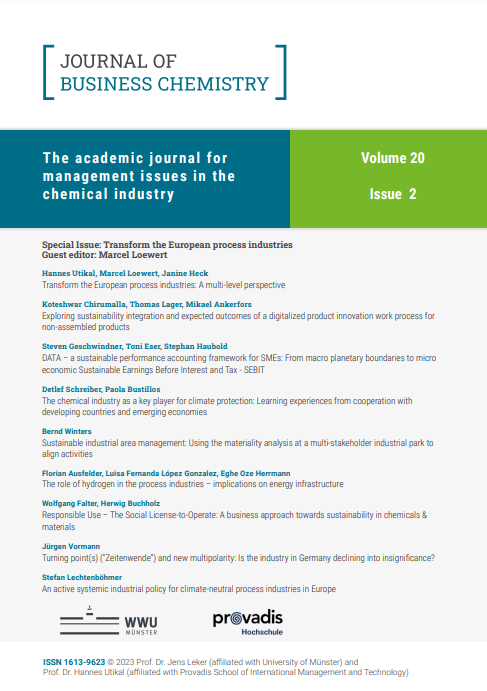Journal of Business Chemistry June 2023
1 Introduction Scientists have long recognized that anthropogenic actions cause emissions that have drastic consequences for the global climate and their warnings are increasing (IPCC, 2023). At the same time, a strong economy has always been necessary for prosperity and security. How could climate protection and economic success be reconciled at the same time? To […]
Abstract Sustainability and digitalization are currently strategic priorities for manufacturing companies to be globally competitive, and one option is to incorporate these aspects in a company product innovation work process; the topical area for this study. An exploratory inquiry has been conducted with nineteen global manufacturing companies in six sectors of the process industries, including […]
Abstract The present article introduces a framework for Small and Medium Enterprises (SMEs) to measure, monetise, integrate, and manage their sustainability within the limits of the planetary boundaries. This innovative approach aims to enable SMEs to transparently depict, monitor, and manage their transformation towards a fully sustainable business model based on key performance indicators. Using […]
Abstract This paper is directed to stakeholders from the private sector, public institutions, civil society, and academia that have to do with the production and use of chemicals or climate change, be it in a direct form or indirectly in advisory institutions, research, or government and regulatory bodies. It is meant as a contribution to […]
Abstract This case study is intended to show how multi-stakeholder industrial sites can form a first common framework for sustainable development. The paper presents the application of the materiality analysis approach to a multi-stakeholder industrial park in Germany. The challenge of a multi-stakeholder industrial area is to align activities of different companies within the park […]
Abstract The industry sector is a significant consumer of energy and emitter of greenhouse gas emissions. Within this sector, the highest energy demand and emissions are caused by the process industries due to the need to chemically transform feedstocks and raw materials into basic chemicals and materials. New processes that include the use of renewable […]
Chemicals & materials are key ingredients in food, health, housing, mobility, communications, leisure, and many more applications. Especially polymers have enabled material welfare for large societal groups since the middle of the 20th century until today. The unwanted side effects of chemical & material mass production and consumption are visible in form of waste, emissions, […]
The following text summarizes a speech held, at Frankfurt Industry Evening, Chamber of Industry and Commerce Frankfurt am Main/Germany on December 13, 2022. The author acted as CEO at Infraserv GmbH & Co. Höchst KG for 18 years. Infraserv Höchst is the operator of the industrial park at Frankfurt-Höchst, a vibrant R&D and production site […]
Abstract To achieve climate neutrality, as envisaged in the Paris Agreement and the European Green Deal, the energy-intensive process industries play a key role. However, shifting their energy base to non-fossil sources and to reduce non-energy related emissions, is a major challenge. For this transformation to succeed, new forms of cooperation between industry, society and […]
